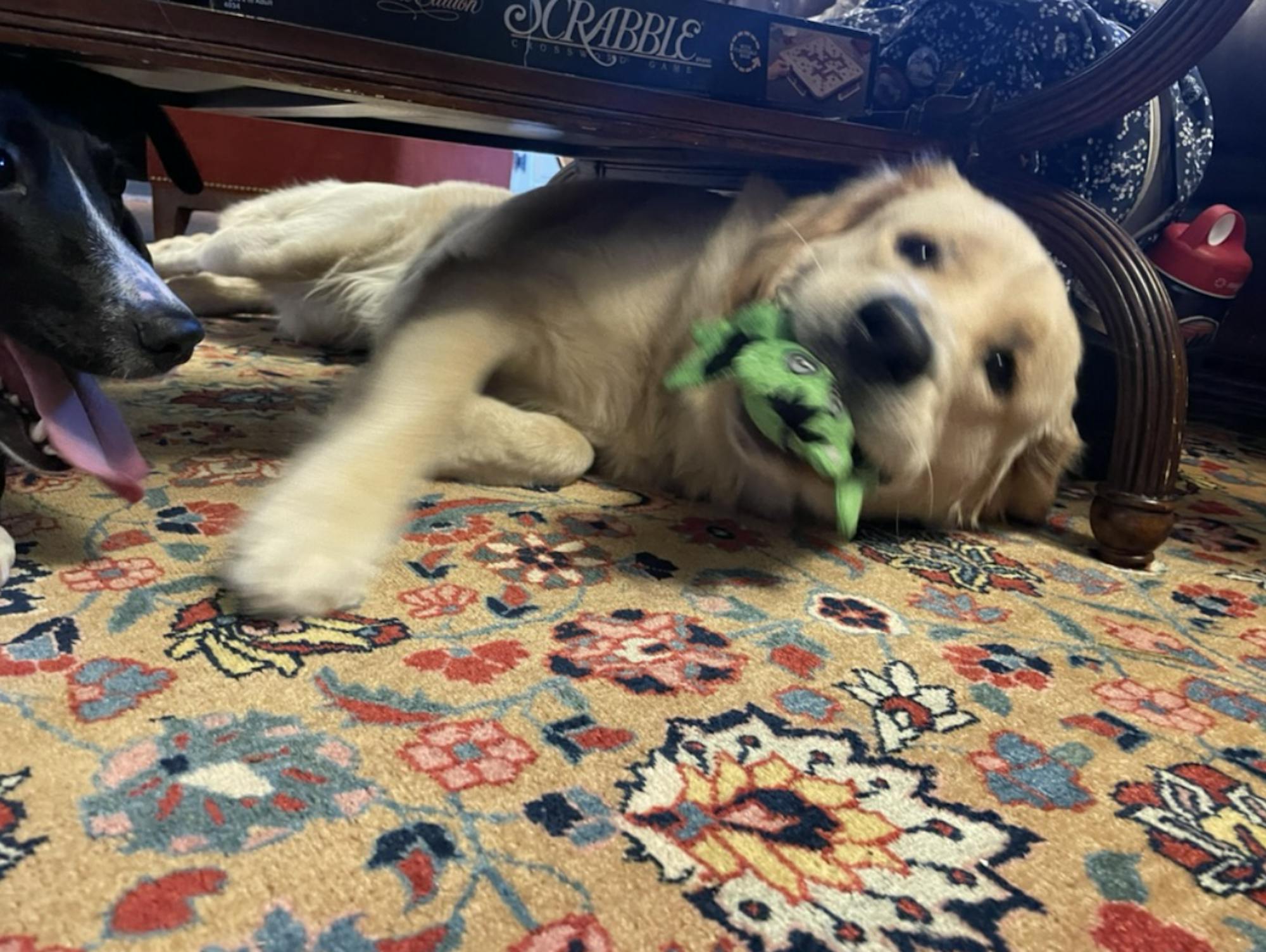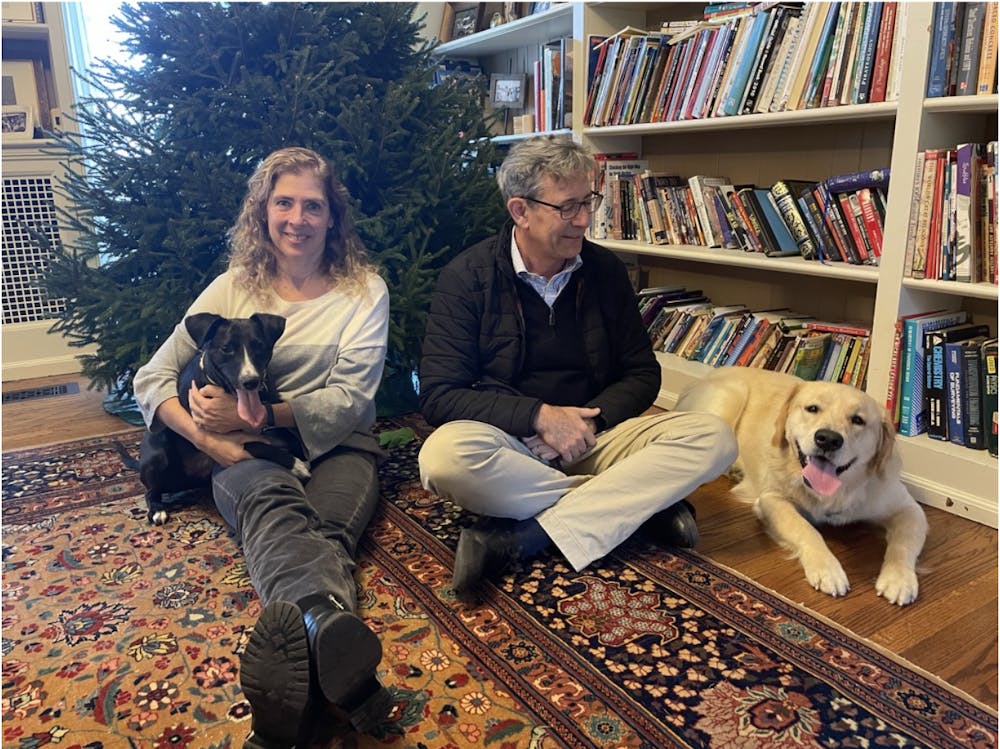In a festive, wreathed home just down the street from Forbes College, Head of Forbes College Maria Garlock and Dean of Forbes College Patrick Caddeau sit amidst a tornado of fur. Fonzie, a one-year-old golden retriever, and Lionela, a black Puerto Rican street dog, occasionally approach their humans for nuzzles. Lionela eventually races off after the toy in Fonzie’s mouth.
This was the scene we encountered when we arrived at Garlock’s house to learn more about her dog, Lionela, and Caddeau’s puppy, Fonzie, and the joy they bring to students at Forbes College. We had stumbled upon a playdate between the furry friends.
“[Fonzie] always loves to steal [Lionela’s] toys,” said Garlock. The two dogs have known each other since they were puppies and have frequent get-togethers arranged by their owners.
“You could kind of call them Romeo and Juliet. She’s going to be so sad when Fonzie leaves,” said Caddeau.
Fonzie is twice Lionela’s size and could be mistaken for an adult dog, but his fuzzy head and unceasing puppy energy reveal his youth. Fonzie was born into a litter of seeing-eye dogs, which are dogs born and trained to aid people with eyesight needs like blindness. After the holidays, Fonzie will need to return to The Seeing Eye — an organization based in Morristown, NJ which breeds guide dogs — to complete the next stages of his training.

“Who, me?” Fonzie runs up to the camera after hearing his name. Meanwhile, Lionela affectionately gnaws on her human’s hand.
Raphaela Gold / The Daily Princetonian
The Caddeaus also have a family dog named CC, a 13-year-old golden retriever. “She helps us raise the [Seeing Eye] puppies, because she’s very calm, sweet, and mellow,” said Caddeau, “and having the puppies around also helps keep her active.”
Caddeau has fostered a number of guide dogs, and he noted that the experience of raising a guide dog is different each time due to the puppies’ varying personalities. In order to meet the high standards of The Seeing Eye, the family went through extensive training to ensure that they were well-equipped to raise the dogs.

“But it’s for good reason, right? In order to get the dogs to be Seeing Eye dogs, they need to have just the right combination of being obedient, but also independent and friendly, and they have to be good companions,” Caddeau explained. He added, “it’s not just the ability to guide blind people, it’s to have somebody who’s really a companion that you can live with [who] brings you joy.”
While Caddeau and his family are always saddened to see their puppies go back to the Seeing Eye after around 14 months of fostering, they enjoy receiving postcards about their dogs’ progress from the trainer.
“It’s just like going off to [first] year of college,” said Caddeau, where the puppies live in kennels with a roommate. “You can stay up late together and play.”
Forbes has hosted study breaks with Seeing Eye, where guide puppies in training come in to play with students. Caddeau believes that having these dogs present in Forbes spreads joy around the community and brings students, Fellows, and faculty together over their shared love of dogs.


The pups play under the coffee table.
Raphaela Gold / The Daily Princetonian
When Lionela first came home this past February, Garlock wasn’t sure how the puppy would behave at her study breaks. She carefully considered which type of dog to get given the fact that she lives on campus and needed a dog who wouldn’t bite, bark, or be nervous around people. Garlock wanted a small lapdog, while her kids preferred a big dog, so they compromised with a medium-sized dog.
Ultimately, Garlock and her family brought home the five-month-old “Sato” who had been flown overseas from a shelter in Puerto Rico and had a family conversation about what to name the new puppy. Since the family is from Argentina, which had just won the World Cup in December, naming the dog after the famous soccer player Lionel Messi seemed the obvious choice. And so the puppy became known as Lionela and sometimes, “Lola.”
Garlock said she was glad to see how comfortable the puppy became around students. “[Lionela] was sleepy all the time, so the students would pet her and she was just in her little heaven,” Garlock explained.
As Lionela got older, however, she became a bit more hesitant around students and would linger at the top of the stairs, before eventually coming to visit the students.
Garlock now keeps Lionela behind a dog rail during study breaks because too many students can be overwhelming for Lionela, but when students ask her to pet the dog, she happily obliges.
“It’s a tricky balance, because there are students who are afraid of dogs and then, there are students who love dogs,” Garlock noted. She added, “I think there’s more of the second category … so I want to make her as accessible for those students as possible.”
Garlock takes Lionela on morning walks around campus, during which she and Lionela are greeted by students on their way to morning classes who recognize the dog and stop for a quick hello. Garlock shared that she thinks students particularly appreciate spending time with dogs in the stressful Princeton work environment.
“[Dogs] just make me so unbelievably happy,” says Madeline McDonald ’26, a member of Forbes College and fellow dog-lover, smiling. As someone who has almost always had dogs in her home growing up, McDonald said she feels “fur deprived” on campus. But getting to hang out with dogs — with Lionela or the Seeing Eye dogs that often come to campus during midterms or finals — boosts her mood.
Compared to study breaks with food or games, McDonald finds dog study breaks to be a beneficial “brain break” on campus, as well as a way to meet new people, as dogs provide a safe space for these connections to be formed. In these settings, people bond over their love of dogs or how much they miss their pets back home.
Garlock also praised the positive impacts dogs have on students. “When students are being graded and tested and trying out for things, it’s so nice to have this little beam of happiness who’s completely free of judgment,” said Garlock, adding, “They’re not worried about emails or the political issues of the moment; they’re just happy to be with you. It just feels like pure affection.”

Having the time of their lives.
Raphaela Gold / The Daily Princetonian
Mira Eashwaran is a staff Features writer for the ‘Prince.’
Raphaela Gold is a staff Features writer for the ‘Prince.’
Please direct any corrections requests to corrections[at]dailyprincetonian.com.








